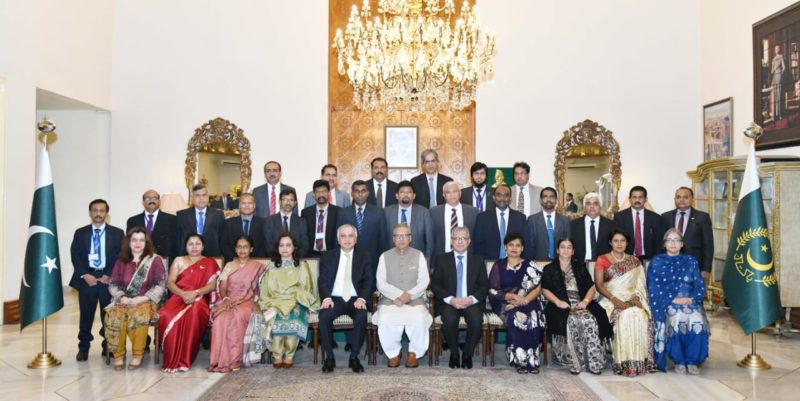Islamabad, Pakistan: “Nation’s progress and rise to excellence can be achieved through hard work, judicious utilization of available resources and sincere leadership and these factors bear fruit only when the civil servants discharge their duties to the best of abilities and with honesty”.
These views were expressed by President Dr. Arif Alvi while addressing the participants of 111th National Management Course and Sri Lankan Civil officers/participants of training at Executive Development Institute (EDI), National School of Public Policy (NSPP) at the Aiwan-e-Sadr, Islamabad on Monday.

The President said that an efficient and impartial civil service was the centerpiece of a vibrant system of governance and within the civil service, the role of senior civil servants as leaders and custodians of state interests carries a special importance, he added. The President advised the officers to keep the betterment of the people in their minds and they should always work toward improving the public service delivery. He said that delay in resolving peoples’ problems would lead to sense of deprivation, therefore, procedural requirements should not cause hindrance towards the redressal of people’s problems.
Addressing the Sri Lankan civil officers, the President hoped that the training course would enhance their capabilities and help them in discharging their official responsibilities in an efficient manner. He said that such course and trainings were an excellent opportunity to share knowledge and learn from each other experiences. He also wished them a pleasant stay in Pakistan.
Replying to a question on prevailing situation in Indian Occupied Jammu and Kashmir the President said that fascist Indian leadership was persecuting minorities and hinduizing India. He added that minorities in India had been living in constant fear. He emphasized that the Will of the people could not be suppressed by power and India too would fail in suffocating the ingenious freedom struggle of the Kashmiris.
He called upon India to immediately stop the use of pellet guns, end the bloodshed, lift the curfew, reverse the clampdown and communications blackout, restore fundamental freedoms and liberties, release political prisoners, stop targeting human rights defenders, and fulfill human rights instruments, as required by International Law.
He further said that it was incumbent upon the international community to work for the realization of right to self-determination for the people of Indian Occupied Jammu and Kashmir, as they have been suffering at the hands of the Indian fascist regime. This extremist regime has endangered the regional and world peace because of its access to the nuclear button, he added.
In reply to a question regarding the economic challenges the President said that the Government inherited multiple economic challenges, but it had taken concrete measures to redress these issues.
Resultantly, trade deficit has narrowed down, number of income tax filers have been increased significantly which would auger well for the documentation of country’s economy. Smuggling and corruption destroy the economy of any nation, therefore, strict measures are required to bridle these menaces, he added.
On a question regarding the civic services crisis in Karachi the President replied that strong synergy was required at the local and provincial level to ensure proper garbage disposal and sanitation, better transport facilities and provision of safe drinking water.
Earlier, Rector, NSPP, Mr. Azmat Ali Ranjha in his opening statement highlighted the achievements of NSPP and the details of course modules to make the senior civil servants abreast with modern techniques to ensure better public service delivery. He also presented to the President a policy paper on “Bureaucratic Decision Making Amid Multiple Accountability”.
NSPP was established on March 15, 2005 under NSPP Ordinance, 2002, with the vision to be recognized as centre of excellence for study of public policy, management, related research and analysis and improvement in quality of decision making with effective implementation for good Governance. The President of Pakistan heads Board of Governors of NSPP.
